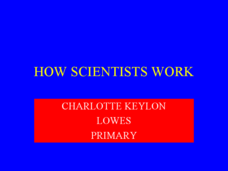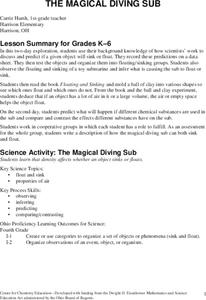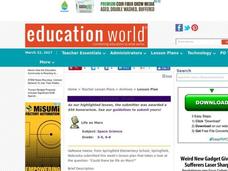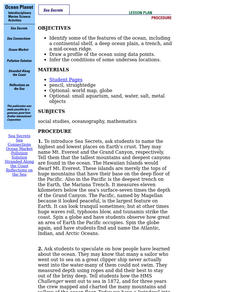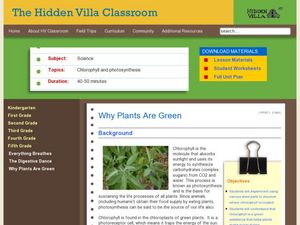Curated OER
Teaching Science Process Skills
Teaching science process skills is a vital part of helping students become good scientists.
American Physiological Society
Did I Observe it or Infer it?
Take the mystery out of inquiry! When young scientists learn to use their keen powers of observation to make smart inferences about a situation, they are well on their way to understanding what the scientific method is all about. Using...
NOAA
Animals of the Fire Ice
When the sun's rays can't reach the producers in a food web, where does all the energy come from? Extreme environments call for extreme food sources. Young scientists investigate creatures that appear to get their energy from methane...
University of Minnesota
Inquiry Cubes
How do you teach kids to "science" effectively? Inquiry cubes are a "sort of" puzzle with no answer—promoting even more questions! Group members work together to use the evidence on the visible sides of each cube to infer what lies on...
US Department of Energy
Electric Avenue: Parallel and Series Circuits
Can you infer the wiring diagram of a series of lights based on their behavior alone? Scholars work with multiple boxes of four lights. They must flip the switch and decide how the lights are wired. By applying their knowledge of...
Curated OER
How Scientists Work
The arsenal of tools a scientist uses to observe the world are varied. This great presentation gives students a look at some of the strategies they should use when looking at the world around them. The information can be used as a...
Curated OER
The Magical Diving Sub
First graders discuss and predict if a given object sinks or floats. They record their predictions on a data sheet. Pupils test the objects and organize them into floating/sinking groups. Students observe the floating and sinking of a...
Curated OER
A Discourse on the History of Language
Analyze and make inferences from the information used by linguists to construct the evolution of languages. They research different dating techniques to explain how scientists infer age with evidence.
Curated OER
Life on Mars
Students research the feasibility of life on Mars and debate what it would need in order to sustain life. They work in teams to predict, research, infer, and explain their theory using models they build.
Curated OER
Is It There?
Students participate in a lesson designed to illustrate these concepts using simple materials. They use Science process skills to observe, measure, predict, make inferences, and communicate while completing the activity. Proper safety...
Ohio Department of Education
Observe Then Infer
Upper elementary scientists learn that observations made can lead to inferences. They rotate through six weather-related stations that challenge them to make observations and then draw inferences from their observations. A...
NOAA
Ground-truthing Satellite Imagery with Drifting Buoy Data
Ground-truthing ... is it even a word? The last installment of a five-part series analyzes how scientists collect sea surface temperature data. Scholars use government websites to compare temperature data collected directly from buoys...
Curated OER
More on Conduction and Convection
Why do some items feel colder when they are the same temperature? How should you keep your soda cold? What makes the wind blow? These are just some of the things middle schoolers discover when completing a lesson plan on conduction and...
Scholastic
Recovery From Drug Addiction
Are there factors that put some individuals at a higher risk for drug addiction than others? Learn more about the risk factors that may make some people more susceptible to addiction, as well as protective factors that help prevent...
Curated OER
Earthquake Epicenter
Students use chart data to determine the location of the epicenter of an earthquake. This task assesses students' abilities to generalize and infer, organize data, interpret data, and apply mathematical concepts.
Curated OER
The Frog and the Ol' Black Fly
Learners explore frogs. In this cross curriculum literacy and frogs lesson, students predict the plot and then listen to the book The Wide-Mouthed Frog by Keith Faulkner. Learners define "predator" and identify foods a frog might eat. ...
Curated OER
Entering the Twilight Zone
Young scholars describe major features of cold-seep communities and the process of chemosynthesis as it relates to organisms in each habitat. In this deep-sea habitats instructional activity, students study the categorization of ocean...
Curated OER
Fieldwork: Horizons Under Ground: Digging Through Wetland Soil
Students study the different soil types and describe the different soils in various environments. In this soil lesson students walk to a reserve and discuss what they saw.
Curated OER
Ocean Planet: Sea Secrets
Young scholars identify ocean features and draw a profile using data points on a map. Through discussion and research, they discover the importance of oceanography and plot a profile of the ocean floor in search for a vessel full of...
Curated OER
Why Plants Are Green
Learners discover the properties of chlorophyll in plants. In this plant biology lesson, students conduct an experiment to find where the chlorophyll in the plant is located. Learners are split into small groups and study plant parts....
Curated OER
Building an Electric Motor
Learners study different motors and how they convert electrical energy to mechanical energy. In this motor lesson students make a model of an electric motor and examine how it can be used to do work.
Science 4 Inquiry
Temperature of Inner Planets
Mars, Earth, and Venus contain atmospheres that generate weather. Young scientists explore the temperature of inner planets. They create a model simulating the greenhouse effect before researching and answering guided questions to...
Science 4 Inquiry
Investigating How Heat Flows
It is impossible to cool down a glass of water by adding ice. Young scientists explore heat transfer through videos, experiments, and interactive games. They quickly catch on that the water melts the ice and things aren't always as they...
Science 4 Inquiry
Levitation Engineers: Exploring Forces
Levitation tricks have been documented from the early 1900s, so how do they do it? Scholars learn about the force of magnetism in an attractive resource. They watch videos and design experiments to understand the strength and...







